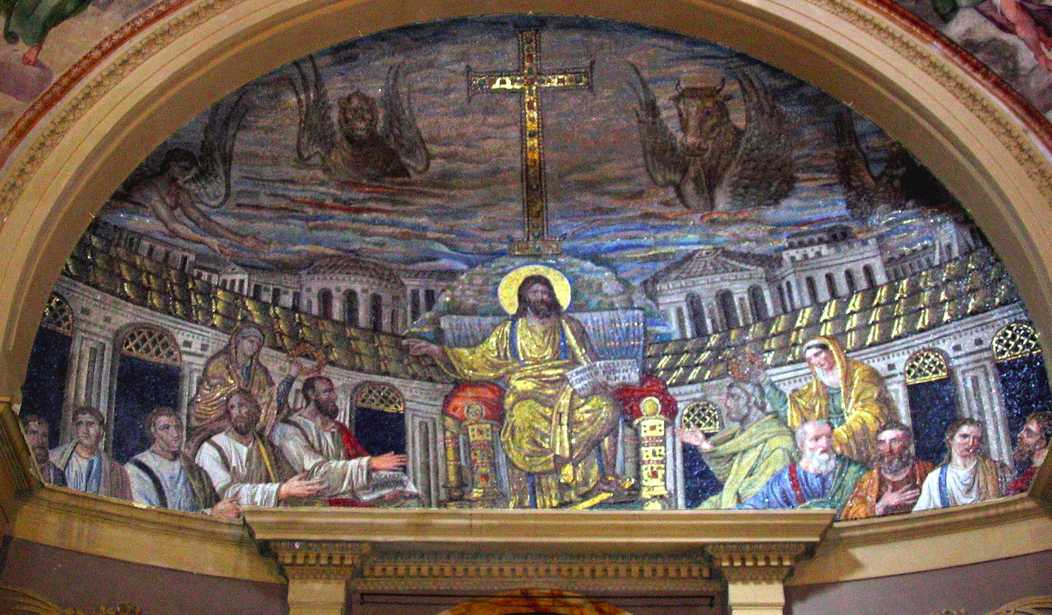Recently, PJ Media published a piece purporting to demonstrate that three Biblical passages refer to the crucifixion of the Messiah. The piece erroneously refers to all three of these passages as “prophecies,” and wrenches them out of context in the attempt to make the point. I have been asked to offer a response indicating what these passages really mean.
The first, which is not a “prophecy,” is Psalms XXII, 16-18. The salient passage is actually at the end of verse 17, which the author renders as follows: “They have pierced my hands and my feet.” On the basis of this reading, he concludes that “the Psalmist” (who is unambiguously identified in verse 2 of the Psalm as King David; we need no vague “ascription” in either Jewish or Christian tradition since it is part of the text) is predicting an event said to have occurred some 900 years in the future from his time.
The problem is that the original text says nothing of the sort. This is how verse 17 reads in the original (in transliteration, for those who don’t read Hebrew): Ki sevavuni kelavim, ‘adath mera‘im heqifuni, ka’ari yadai veraglai. An accurate English translation is: “For dogs have surrounded me, a community of evil-doers has hemmed me in, like a lion, my hands and feet.”
The verb “pierce” doesn’t occur anywhere in the passage; the reader will also note the verb tense, which is perfective, referring to a situation which has already occurred and is a current fact.
Putting this into the context of the rest of the Psalm, it is a lament by King David who feels G-d-forsaken and abandoned, beset by his enemies on all sides — E-li E-li lamma ‘azavtani (“My G-d, my G-d, why have you abandoned me?”) — and goes on to discuss his trials. He then prays: Ve’atta Ha-Shem al tirchaq eyaluthi le‘ezrathi chisha. Hatzila mecherev nafshi, miyad kelev yechidathi. Hoshi‘eni mipi arye, umiqarnei remim ‘anithani (“And You, Ha-Shem, my strength, be not distant, hasten to my aid. Rescue from the sword my life, from the hand of a dog my soul. Save me from the mouth of the lion, You have answered me from the horns of remim” [the rem was a large, horned beast, now extinct, which was apparently still around in David’s day].) It goes on in this vein until the end.
We can’t know for certain, but this Psalm was probably composed about the time King Sha’ul was hunting David down, or perhaps during the revolt of his son Avshalom, when he was also being pursued. In this vein, it is similar to other Psalms which David composed at times of great stress, when it seemed his prayers weren’t being answered; see Psalms CXVIII, 10-12: Kol goyim sevavuni, beshem Ha-Shem ki amilam. Sabbuni gam sevavuni, beshem Ha-Shem ki amilam. Sabbuni kidvorim do‘achu ke’esh qotzim, beshem Ha-Shem ki amilam (“All nations have surrounded me, for in the name of Ha-Shem I will destroy them. They enveloped me, also surrounded me, for in the name of Ha-Shem I will destroy them. They enveloped me like bees, thorns stung like fire, in the name of Ha-Shem I will destroy them.”)
No messiah here, but rather a king harried by his enemies.
The second passage mentioned is at least an actual prophecy. The passage is Isaiah LII, 1-LIII, 12, popularly known as the “suffering servant” passage. The salient part begins in chapter LIII: Nivze vachalal ishim, ish mach’ovoth vidua choli uchemaster panim mimmennu velo chashavnuhu (“Despised and wounded of men, a man of pains known of illness and like one hiding the face from him; despised, and we did not consider him.”) Thus verse 3 of the chapter.
The issue here isn’t whether or not the Jewish tradition had any concept of a “suffering messiah,” rather, it is “who is the prophet talking about?” Who is the “he” and who are the “we”?
A clue may be found in the previous chapter, where repeatedly G-d refers to ‘ammi (“my people”; cf. e.g. vv. 5-6, of whom he tellingly says: Hinne yaskil ‘avdi yarum veyissa vegavah me’od [“Behold, My servant will act wisely, he shall be exalted and elevated.”]) Chapter LII deals with the exaltation and vindication of Israel which will occur during the final redemption; it is only then that the nations will have the scales fall from their eyes, and they will face up to the enormity of the crimes they’ve committed against Israel throughout the centuries.
Israel is the “suffering servant” of this chapter; both the words ‘am (“people”) and ‘eved (“servant”) are masculine singular words and are routinely referred with the third person masculine singular pronoun.
Who are the “we”? The nations, looking on in horror as they consider the atrocities down through the ages committed against Israel by them. In context, therefore, we can understand what is being prophesied here. No mention of crucifixion.
The third passage is again a prophetic passage: Zechariah XII, 10. The verse, which also deals with the events of Israel’s final redemption, reads as follows: Veshafachti ‘al beyth David ve‘al yoshev Yerushalayim ruach chen vethachanunim, vehibbitu elai eth asher daqru vesafdu, ‘alav kemispad ‘al hayachid, vehamar ‘alav kehamer ‘al bachur (“And I shall pour on the house of David and the resident of Jerusalem a spirit of grace and supplications, and they will look to Me whom they have stabbed and they shall mourn for him as one mourns for an individual, and will feel bitter about him as one feels bitterness on one’s first-born.”)
This, indeed, has something to do with a messiah, but not the final Mashiach ben David. Israel’s final redemption will, in fact, come in two stages, because there are two royal houses in Israel: one from Efrayim ben Yosef, the royal house which ruled in the northern kingdom of Israel, and one from the house of David, who ruled first in the united kingdom and subsequently in the southern kingdom of Yehuda. This verse concerns Mashiach ben Yosef, who will lead the ingathering of the exiles and conduct the final war of which Zechariah speaks so eloquently. He will not survive, but will pave the way for reign of Mashiach ben David, who will reign at the end of history (cf. Metzudath David on the passage beginning with verse 8, Rashi and Malbim ad loc.).
There is, again, no mention of crucifixion at the hands of the Romans, and so the claim that this refers to the execution of a Galilaean carpenter for treason against the Roman emperor falls flat.









Join the conversation as a VIP Member